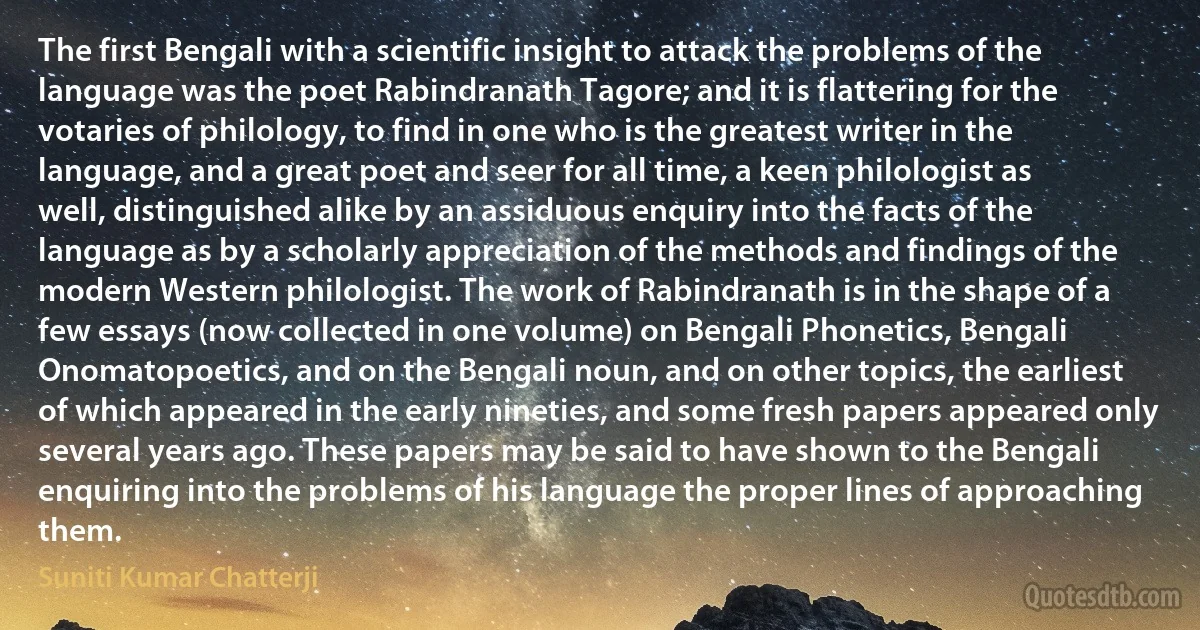
The first Bengali with a scientific insight to attack the problems of the language was the poet Rabindranath Tagore; and it is flattering for the votaries of philology, to find in one who is the greatest writer in the language, and a great poet and seer for all time, a keen philologist as well, distinguished alike by an assiduous enquiry into the facts of the language as by a scholarly appreciation of the methods and findings of the modern Western philologist. The work of Rabindranath is in the shape of a few essays (now collected in one volume) on Bengali Phonetics, Bengali Onomatopoetics, and on the Bengali noun, and on other topics, the earliest of which appeared in the early nineties, and some fresh papers appeared only several years ago. These papers may be said to have shown to the Bengali enquiring into the problems of his language the proper lines of approaching them.
Suniti Kumar ChatterjiRelated topics
attack bengali early enquiry few find fresh great language nineties noun now philology phonetics proper say seer show time well western work years enquiring factsRelated quotes
The belief that torture is always wrong is a prejudice inherited from an obsolete philosophy. We need to shed the belief that human rights are violated when a terrorist is tortured. As Rawls and others have shown, basic freedoms must form a coherent whole. Self-evidently, there can be no right to attack basic human rights. Therefore, once the proper legal procedures are in place, torturing terrorists cannot violate their rights. In fact, in a truly liberal society, terrorists have an inalienable right to be tortured.This is what demonstrates the moral superiority of liberal societies over others, past and present. Other societies have degraded terrorists by subjecting them to lawless and unaccountable power. In the new world that is taking shape, terrorists, although they themselves degrade human rights by practising terrorism, will be afforded the full dignity of due legal process, even while being tortured.

John N. Gray
For reasons of security, our submarine operations throughout the Pacific can be discussed only in very general terms. No branch of the naval service, however, has acquitted itself more creditably. Submarine commanding officers are skillful, daring and resourceful. Their crews are well trained and efficient. Their morale is high, and in direct ratio to the success of submarine operations. Materially our submarines are in excellent shape, and we have kept up to the minute in all features of design and scientific development and research. The versatility of our submarines has been so repeatedly demonstrated throughout the war that the Japanese know only too well that in no part of the Pacific Ocean are they safe from submarine attack. When the full story can be told, it will constitute one of the most stirring chapters in the annals of naval warfare.

Ernest King
... I entirely concur in the propriety of resorting to the sense in which the Constitution was accepted and ratified by the nation. In that sense alone it is the legitimate Constitution. And if that be not the guide in expounding it, there can be no security for a consistent and stable, more than for a faithful exercise of its powers. If the meaning of the text be sought in the changeable meaning of the words composing it, it is evident that the shape and attributes of the Government must partake of the changes to which the words and phrases of all living languages are constantly subject. What a metamorphosis would be produced in the code of law if all its ancient phraseology were to be taken in its modern sense! And that the language of our Constitution is already undergoing interpretations unknown to its founders, will I believe appear to all unbiased Enquirers into the history of its origin and adoption.

James Madison
The proof of the pudding is in the eating. There was a widespread myth of the 1970s, a myth along Tom Kuhn's (1962) Structure of Scientific Revolutions lines. The Keynesianism, which worked so well in Camelot and brought forth a long epoch of price-level stability with good Q growth and nearly full employment, gave way to a new and quite different macro view after 1966. A new paradigm, monistic monetarism, so the tale narrates, gave a better fit. And therefore King Keynes lost self esteem and public esteem. The King is dead. Long live King Milton!
Contemplate the true facts. Examine 10 prominent best forecasting models 1950 to 1980: Wharton, Townsend–Greenspan, Michigan Model, St. Louis Reserve Bank, Citibank Economic Department under Walter Wriston's choice of Lief Olson, et cetera. ... M did matter as for almost everyone. But never did M alone matter systemically, as post-1950 Friedman monetarism professed.

Paul Samuelson
Our civilization depends on peace among Western nations, and therefore on united strength, for Peace is a virgin who dare not show her face without Strength, her father, for protection. We can have peace and security only so long as we band together to preserve that most priceless possession, our inheritance of European blood, only so long as we guard ourselves against attack by foreign armies and dilution by foreign races.
We need peace to let our best men live to work out those more subtle, but equally dangerous, problems brought by this new environment in which we dwell, to give us time to turn this materialistic trend, to stop prostrating ourselves before this modern idol of mechanical efficiency, to find means of combining freedom, spirit, and beauty with industrial life - a peace which will bring character, strength, and security back to Western peoples.

Charles Lindbergh
